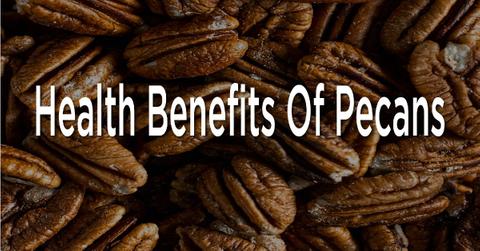Health Benefits Of Pecans

June 8 2022, Updated 3:29 p.m. ET
What Are Pecans?
Pecans are widely used nuts that belong to the genus Carya and come in over 1,000 different varieties. Pecans are used as raw ingredients in candies, salads, cookies, etc. They are usually confused with walnuts due to their similar appearance. You can visit the pecan vs. walnut page to see the difference between them.
Health Benefits
Pecan nuts are tasty, healthy, and available all year. Some nutritionists recommend the daily consumption of pecans for their health benefits. You can visit our Pecan Nutrition & Calories page to learn more.
Cardiovascular Health
Overall, pecans contain high levels of magnesium and potassium, which help lower blood pressure.
Pecans contain monounsaturated fat, which is a type of healthy fat. According to the study [1], monounsaturated fatty acids can help lower blood total cholesterol and low-density lipoprotein, lowering the risk of cardiovascular disease, particularly coronary heart disease. Maintaining a low LDL cholesterol level lowers your chances of stroke or heart attack.
Another study [2] showed that people with coronary artery disease who consumed 30 grams of pecans daily for 12 weeks improved the ratio of total cholesterol to HDL cholesterol in the blood.
Pecans are also a good source of linoleic acid, which has a one-of-a-kind role in promoting heart health. Randomized clinical trials have shown that replacing saturated fat with linoleic acid lowers total and LDL cholesterol [3].
Diabetes
According to the American Diabetes Association, nuts, particularly those with high fiber content and a low GI, are diabetes superfoods. One study [4] shows that eating a serving of pecans a day can improve serum insulin, insulin resistance, and beta-cell function in at-risk adults.
Besides, because pecans have a low glycemic index, they do not cause a spike in blood sugar, even in people with diabetes.
Cancer
Flavonoids are secondary metabolites found in various nuts. Pecan nuts are high in flavonoids and phenolic compounds, which means that consumption of these beans may help prevent oxidative stress-related diseases [5].
The most important natural antioxidants found in plant fats are tocopherols. According to research, tocopherols have an antioxidant effect on the body and may help to prevent oxidative stress. Pecans contain 1.4 mg of a-tocopherol per 100 g, making them a good source of c-tocopherol but a poor source of a-tocopherol. These antioxidants have been linked to various biological activities such as antioxidant, anti-inflammatory, antiviral, and anti-cancer properties [6].
Anti-inflammatory effects
Antioxidants found in pecans, besides anti-cancer effects, also have anti-inflammatory effects on the body. In particular, polyphenols and Vitamin E are potent antioxidants and anti-inflammatory compounds. According to research [7], these compounds fight against inflammation and play a role in disease initiation and progression, such as neurodegenerative diseases and cancer.
Improve Brain Function
Pecans are high in the Vitamin B family, essential for proper neurological development and function.
One study indicates [8] that monounsaturated fatty acids found in pecan may aid in the prevention of mental decline and inflammation. Besides, pecans are high in potassium, promoting nervous system health by increasing blood flow to the brain.
Another study shows that higher consumption of nuts was associated with improved long-term cognition in 15.000 women over 40 years [9].
Skin Health
Pecans are well-known acne-fighting nutrients. These nuts are high in selenium, which acts as an antioxidant when combined with Vitamin E, keeping skin hydrated and reducing inflammation.
Pecans contain various vitamins and antioxidants, including ellagic acid, Vitamin A, and Vitamin E. These specific vitamins and antioxidants combat free radicals, which are the leading cause of skin aging. As a result, pecans aid in preventing fine lines, wrinkles, and skin discoloration [10].
Prevents Hair Loss
Pecans are high in amino acids, which help to promote healthy hair growth. Furthermore, the nutrients in pecans can aid in preventing hair loss. Pecans are high in iron, and iron fights anemia, the leading cause of hair loss [11].
Weight Loss and Diets
Pecan has a low glycemic index, no cholesterol, and high fiber, making them a perfect complement to weight loss diets. You can read more on the pecan and weight loss diets page.
Pecans are keto-friendly food since they have a tiny amount of net carbs (only one gram per saving) and a high amount of healthy fats [12].
Pecan nuts are also an excellent addition to the DASH Diet, Atkins Diet, Paleo Diet, Vegan/ Vegetarian, and Dukan Diet.

Other Health Benefits
Zinc-rich foods, such as pecans, are frequently used as natural immune boosters. Zinc reduces the risk of catching a cold when taken for at least five months, and taking supplements when you're sick can hasten the healing process [13].
Eating nuts during the first trimester of pregnancy can help a child's neuropsychological development. According to research [14], eating nuts during pregnancy has long-term benefits for a child's cognitive development. Children whose mothers consume 2–3 ounces of nuts per week during the first trimester of pregnancy have higher IQ, memory, and attention.
Downsides And Risks
Allergy
Although pecan nuts have potential health benefits, they also have some downsides.
Patients who have tree nuts allergy also can be allergic to pecans. Symptoms are usually expected and include itching, swelling, and burning in the mouth and throat.
In some cases, nuts allergies can cause anaphylactic shock, which can be fatal. People who have this allergy should avoid all nuts and nut products [15].
References
- https://pubmed.ncbi.nlm.nih.gov/11533266/
- https://pubmed.ncbi.nlm.nih.gov/31856379/
- https://www.ncbi.nlm.nih.gov/pmc/articles/PMC5827884/
- https://pubmed.ncbi.nlm.nih.gov/26561616/
- https://www.ncbi.nlm.nih.gov/pmc/articles/PMC5012104/
- https://www.sciencedirect.com/science/article/abs/pii/S0271531706001278
- https://pubmed.ncbi.nlm.nih.gov/31692959/
- https://www.ncbi.nlm.nih.gov/pmc/articles/PMC3098039/
- https://www.ncbi.nlm.nih.gov/pmc/articles/PMC4105147/
- https://pubmed.ncbi.nlm.nih.gov/18494484/
- https://pubmed.ncbi.nlm.nih.gov/18296370/
- https://www.ncbi.nlm.nih.gov/pmc/articles/PMC3945587/
- https://www.ncbi.nlm.nih.gov/pmc/articles/PMC5748737/
- https://pubmed.ncbi.nlm.nih.gov/19562864/
- https://www.ncbi.nlm.nih.gov/pmc/articles/PMC7811165/


